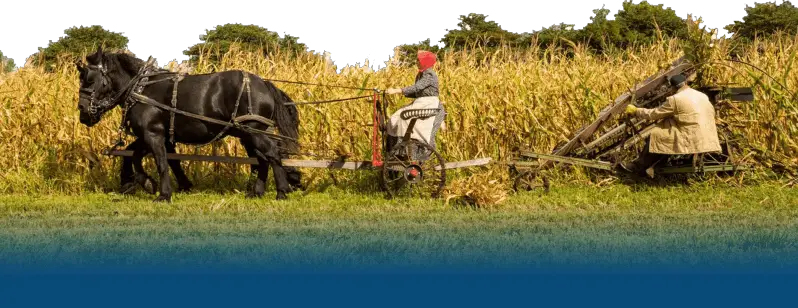
Living History Farms Des Moines Iowa – Choose a wedding venue full of character, historic charm and stunning views at Living History Farms. Walnut Hill’s Prairie Gothic Church of the Earth, dating from 1876, is ideal for intimate ceremonies, while the Flynn Barn, built in 1870 and listed on the National Register of Historic Places, provides a beautiful rustic backdrop. celebration marriage The Visitor Center’s Great Hall offers a unique space with exposed beams, skylights, brick, inlaid wood and French doors opening to a stone courtyard surrounded by evergreen trees. Or explore some of our existing outdoor spaces, such as the Walnut Hill Gazebo, the front porch of the Victoria Flynn Mansion, or the native woods on the museum grounds. We can host 130-160 guests depending on the venue and the rental includes free parking for you and your guests as well as free set up and tear down of tables and chairs.
Living History Farms is an outdoor history museum located in Urbandale, IA. Hotels and restaurants are nearby and the museum is easily accessible via the Interstate 35/80 combined highway. (Take Interstate 80 to exit 125.)
Living History Farms Des Moines Iowa
Fees vary depending on which of our rentals you book and the length of your event. For information please call (515)278-5286 ext. 126 or email events@LHF.org. Living History Farms is a 500-acre outdoor museum located in Urbandale, Iowa, USA. The museum’s mission is to educate visitors and showcase Iowa’s past 300 years of agricultural history. The museum, as its name suggests, follows a living history approach depicting the lives of people living on farms in the 1700s, 1850s and 1900s by measuring various agricultural activities.
On The Run
Agricultural economist at Iowa State University and two-time gubernatorial candidate. William G. Murray founded the publicly traded company in 1970. This is where most of the history happens.
Living History Farms, Pope John II. It was the site of John Paul’s Mass and sermon on October 4, 1979 to an audience of approximately 340,000.
In his speech, the Pope spoke about the importance of agriculture and linked the people who work the land to the livelihood of the people of the country. He also explained about the importance of soil conservation.
The museum is bisected by Interstate 35/80, and a tractor-drawn trolley takes visitors from downtown (next to Trans. in the visitor setter.) to the west side of the museum. After visiting 1700 Iowa Farm, 1850 Farm, 1900 Farm and the Wallace Fairgrounds, visitors return to the east side of the interstate. Walnut Hill Township, dating to 1875, has several buildings, including the Martin and L. Flynn House and Barn, both original to the site.
Tangen Family Home
1700 Iowa Indian Farm Featuring Iowa Indian farming practices. Archaeologist Mildred Mott Wedel was consulted to design the project.
The farm has crops dating back to the 1700s, including blue corn and Omaha melons. Interpreters educate visitors about the Iowa way of life, including hunting, men’s and women’s roles, and tool making. Demonstrations include leather tanning, cooking and traditional pottery making.
An 1850 pioneer farm includes a log cabin where visitors can watch pig iron cooking over a fire, as well as manual labor such as wool spinning and candle making. Outside visitors can see plows driven by oxen in fields full of corn, wheat and potato crops.
Walnut Hill Settlement, which has been active since 1875, other notable town buildings include a store, schoolhouse, Victorian mansion, bank and law office. It describes the relationship and loyalty between the city, townspeople, merchants and farmers.
Living History Farms: 1850 Living Quarters
A 1900 Horse Farm shows the changes modern technology and the Industrial Revolution brought to farm life. Manual labor was replaced by the use of machinery and agricultural work changed to include techniques such as canning.
A particular type of description used at Living History Farms is third-person, so people interacting in the museum don’t actually try to “act” like themselves, even if they’re dressed for the period. The person they are commenting on (actions, etc.). Performers often perform this piece and say, “I baked this bread,” or address the audience, “This is what a printing press looked like in 1875.” But because the presenters don’t move, visitors can ask questions about current affairs and get direct answers.
Senior living des moines iowa, cost of living des moines iowa, living farms des moines iowa, des moines iowa history, living history farms des moines, assisted living des moines iowa, downtown living des moines iowa, living in des moines iowa, farms for sale in des moines iowa, independent living des moines iowa, farms for sale near des moines iowa, des moines iowa living